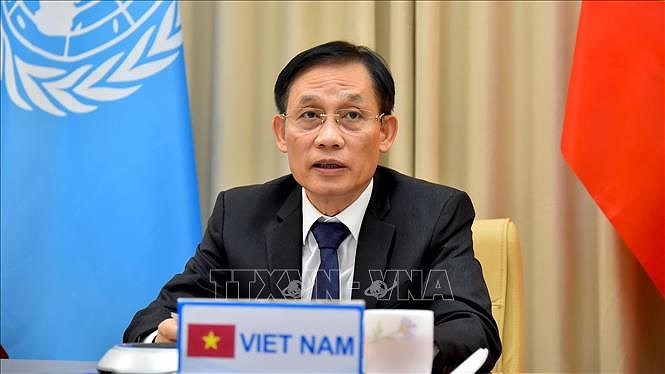 Deputy Foreign Minister Le Hoai Trung. (Photo: VNA)
Deputy Foreign Minister Le Hoai Trung. (Photo: VNA)
Deputy Foreign Minister Le Hoai
Trung highlighted new and important points in Vietnam’s foreign policies in the
new tenure as outlined in the documents submitted to the 13th National Party Congress in an interview granted to the Vietnam News Agency.
The documents of the 13th National Congress noted
that foreign affairs in all three pillars – Party’s external relations, State
diplomacy and people-to-people diplomacy – have contributed to remarkable
achievements of the country, Trung said.
Vietnam has improved the effectiveness, and further
expanded and deepened relations with many international partners, he said,
noting that the country has so far increased the number of strategic and
comprehensive strategic partners to 30, including all permanent members of the
United Nations Security Council (UNSC) and most members of the world’s major
political and economic blocs, especially neighbouring countries.
Vietnam has also maintained territorial integrity and national
sovereignty and made many concrete steps forward in settling border issues. Vietnam
has completed border delimitation for over 5,000km land borderline it shares with
all three neighbouring countries – Laos, Cambodia and China, he noted, adding
that border demarcation and marker planting work has completed for the borders
with Laos and China while it has been 84 percent done along the border with
Cambodia.
The country has made the most of the opportunities
brought by international integration to bolster socio-economic development, as
seen in attracting foreign investment, boosting trade and tourism and accessing
scientific-technological advances while maintaining national independence,
particularly self-sustenance in economy.
According to the Deputy FM, over the previous years,
Vietnam has also promoted cultural diplomacy to promote the country
internationally while absorbing the essence of global cultures. Diplomacy also
helped address arising problems relating to overseas Vietnamese, thus protecting
legitimate rights of Vietnamese people overseas.
The documents affirmed Vietnam’s consistent foreign
policy of independence, peace, cooperation and development; being a responsible
and trusted friend and partner of the international community; promoting
multilateralisation and diversification of external relations; and ensuring
national interests based on international law and equality among countries. The
diplomatic sector is assigned the task of playing the pioneering role in
creating and maintaining a peaceful environment favourable for national renewal
and development, thus enhancing the country’s position.
The documents clearly state that foreign affairs must
base on three pillars: Party’s external relations, State diplomacy and
People-to-people diplomacy.
One of the new points in the documents focuses on
improving the effectiveness of and deepening bilateral relations and enhancing
multilateral diplomacy.
Regarding the protection of border territories,
sovereignty, sovereignty of sea and islands, Deputy Minister Trung said the
goal of Vietnam's foreign policy is to maintain a peaceful and stable
environment for the country's development, to make the best use of favourable
conditions for the Doi Moi cause and socio-economic development, thus elevating
the position of Vietnam in the international arena and contributing to the
common work of the international community.
The most important goal is to firmly and persistently maintain
national independence, sovereignty and territorial integrity. This goal has
been put at the top position in the foreign policy of Vietnam throughout many
Party congresses as well as at the 13th Congress.
On the issue of sovereignty protection, including land
and sea border and territories, many very important tasks have been and are
being carried out, involving the implementation of the agreements signed
between Vietnam and China, Laos and Cambodia relating to border demarcation and
mark planting; the management of border marks and border gates, and others. According
to the official, Vietnam both promotes socio-economic development and
coordinates with countries sharing the land borders to combat all forms of
crime, ensuring security and safety in border areas.
The Deputy Foreign Minister suggested intensifying
connectivity between border regions with other regions nationwide and upgrade
infrastructure there.
For the border at sea, Vietnam and other countries share the
East Sea and other international waters, in accordance with the 1982 United
Nations Convention on the Law of the Sea (UNCLOS), he said, noting that under
the convention, countries bordering the East Sea have the same interests and
cooperation.
Vietnam’s consistent policy is to work with countries
involved to address disputes in the East Sea peacefully in conformity with the
UNCLOS and international law, stated Trung./.